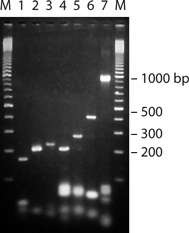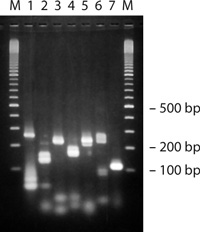The analysis of nucleic acid from formalin-fixed, paraffin-embedded (FFPE) specimens is challenging due to the extensive cross-linking of all tissue components during the fixation process. These challenges include chemical modification of the DNA, cross-linking of DNA with other molecules, degradation of the DNA, and the limited amount of nucleic acid in the samples.
The QuickExtract™ FFPE DNA Extraction Kit is a fast, simple, and inexpensive method for preparing genomic DNA for PCR amplification from archival samples. The protocol requires only heat treatment to melt the paraffin, lyse the cells, decrease the fomalin-induced cross-linking in the sample, and degrade compounds inhibitory to amplification. Following heat treatment, the sample DNA is ready for PCR. This product is only intended for PCR-based applications. If DNA is required for other molecular biology applications, consider the MasterPure™ DNA Purification Kit.
 |
 |
Figure 1. PCR amplification of DNA from a slide-mounted, FFPE-preserved human skeletal muscle tissue section, extracted with the QuickExtract™ FFPE DNA Extraction Kit.
Two microliters of undiluted, extracted DNA was amplified with primers for three different loci: tumor protein 53 (TP53), dystrophin (DMD), and tumor necrosis factor (TNF). The products were separated on a 3% agarose gel and were visualized with SYBR® Gold. Lane M, 100 bp DNA ladder; Lane 1, exon 2 of TP53; Lane 2, exon 3 of TP53; Lane 3, exon 11 of TP53; Lane 4, exon 6 of DMD; Lane 5, exon 50 of DMD; Lane 6, exon 3 of DMD; Lane 7, exon 4 of TNF. |
 |
Figure 2. Short Tandem Repeat (STR) PCR amplification of DNA from slide-mounted, FFPE-preserved, human tissue sections, combined and extracted with the QuickExtract™ FFPE DNA Extraction Kit.
Two microliters of undiluted, extracted DNA was amplified with primers for seven different STR loci. The products were separated on a 3% agarose gel and were visualized with SYBR® Gold. The expected allele-to-allele variation in STR sequences results in multiple products per primer set. Lane M, 100 bp DNA ladder; Lane 1, RENA4; Lane 2, D3S1358; Lane 3, D7S820; Lane 4, THO1; Lane 5, D19S253; Lane 6, D21S11; Lane 7, AMEL. |
If you cannot find the answer to your problem then please contact us or telephone +44 (0)1954 210 200